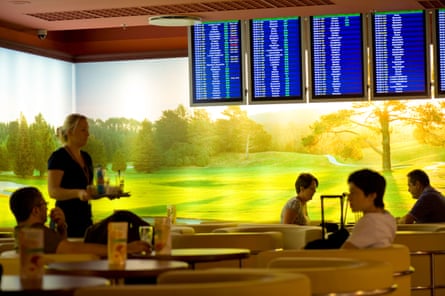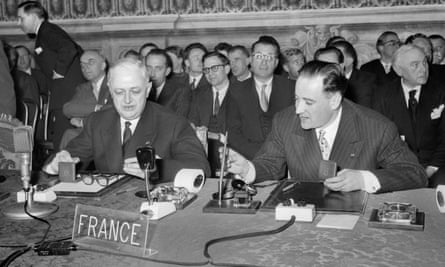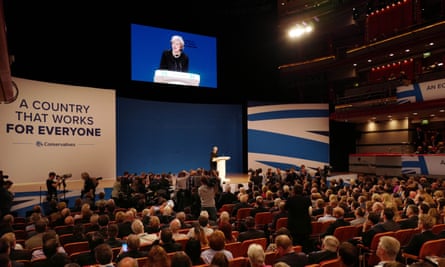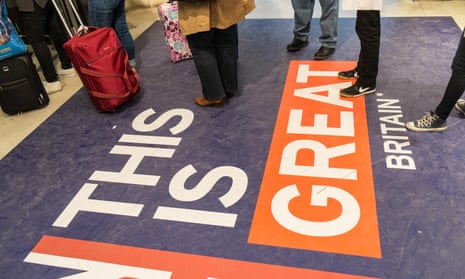On a scorching afternoon, a small group of tourists are queuing on a pretty, wooded hillside to get their photo taken. There is no stunning view or dramatic scenery, only a stone pillar and three flags, belonging to Germany, the Netherlands and Belgium. This is the place where three countries meet, an epitome of the dream of a borderless Europe, where you can cross the three frontiers in two steps.
“For our generation it is normal to cross the border,” says Michael, a 24-year old architecture student at the University of Aachen, who is visiting with his mother and a friend. “I feel more European than German and I like the fact that I can go and work in the Netherlands or Belgium if I want to.”
Down in the valley on the Dutch side lies Vaals, a bustling market town of 10,000 people. Almost half the population (44%) were born in another country: one third are Germans, but people have moved here from all over Europe; last year the town took in 30 Syrian refugees.
“We are living in a European region and people cross the borders without really thinking of it,” says Reg van Loo, Vaals’ mayor. Apart from a few road signs and buzzing text messages (telecoms are national), there is little to show you are crossing a border.
For some EU leaders this remains the European dream. “Borders are the worst invention ever made by politicians,” Jean-Claude Juncker, European commission president, and Luxemburger, declared in August, just as checks were being tightened across the continent.
But in living memory, Europe’s borders were far more tightly controlled. In the aftermath of the second world war, Vaals was a hotbed for smugglers. Packets of coffee and cigarettes were lobbed over border fences into a ruined Germany, as locals sought to cash in on shortages. By the 1970s the Dutch were driving across the border, car boots laden with undeclared West German hi-fis and cameras. “Vaals has always been a very plural place,” Van Loo says, describing how 18th-century Catholics and Protestants of all denominations could worship in the town when it was forbidden elsewhere.
Yet this dream of freedom to live and work anywhere in the European Union has been called into question like never before since the Brexit vote. Britain is set to become the first country to leave the EU, in a hostile rejection of one of Europe’s most cherished dreams.
Free movement of people, a high-minded ideal that was intended to make the EU more popular, has instead become the wedge that will split the UK from its continental partners.
In her first major speech on Brexit, Theresa May, the UK prime minister, made clear the UK wants to control immigration as she set the course for a sharp break with the EU that may also limit Britain’s trade with its neighbours.
British governments have always been cheerleaders for free movement of goods, services and capital, while underestimating the continent’s attachment to the same privilege for people. David Cameron thought he could persuade the German chancellor, Angela Merkel, to grant him limits on EU migrants. He was wrong: the former prime minister did get an emergency brake to ban EU migrants from getting immediate access to benefits, but this was dismissed as useless by Conservative backbenchers set on leaving the EU.
Since Cameron’s renegotiation, it has been clear the EU would not budge on free movement of people. Martin Schulz, the president of the European parliament, said last month that the EU’s four freedoms – people, services, goods and capital – were inseparable, echoing a consensus among EU leaders that shows no sign of cracking. “I refuse to imagine a Europe where lorries and hedge funds are free to cross borders but citizens are not,” Schulz said.

Merkel on Wednesday made her clearest statement yet – saying full access to the single market could only come in exchange for signing up to the four freedoms. “Anything else would amount to a systemic challenge for the entire European Union,” she told the BGA trade association.
Free movement runs through many fundamental questions for the EU, says André Sapir, a professor at the Bruegel thinktank and influential former adviser to the European commission: the relationship between western and eastern Europe, how the EU manages an unprecedented influx of refugees, as well as attitudes to Turkey and its long-stalled hopes of joining the EU.
“We are not simply making a deal with the UK. The number of dimensions here is endless,” Sapir said. “If you start putting brakes on this now, in a sense, you are going back on the original EU project. It is one thing the UK leaving, it is another one to start tinkering with the EU as we know it.”
Free movement was part of the European idea from the start, when six countries embarked on integration nearly 60 years ago at the Conservatori palace in Rome. The Treaty of Rome and its four freedoms created the fledgling European Economic Community that became today’s EU.

But free movement was not carved on stone tablets and initially was restricted to workers. Damian Chalmers, professor of EU law at the London School of Economics, describes the original provision as an afterthought tacked on to please the Italian government. Of the three biggest founding members, France had got farm subsidies and Germany had abolished tariffs for its industrial goods. The Italian government, grappling with the poor southern part of the country, wanted a payoff, says Chalmers, describing Italian workers who moved north as the “central-eastern Europeans of the 1950s”.
Free movement of workers did not become free movement of citizens until 1993, following another treaty, signed at Maastricht, a city deep in EU heartland that is a short distance from Vaals.
After Maastricht, Europeans could not only work abroad but study or retire in other EU countries. Amid the surge in optimism following the fall of the Berlin wall, Brussels hoped that citizenship would give the European project the mass appeal it had always lacked.
“The people you talk to in Brussels see [free movement] as central to the dream of a people’s Europe, that is not just about multinationals,” said Chalmers.
But still, not many people felt starry-eyed about the EU, or much inclined to live abroad. Few EU nationals chose to move to another country, a fact that caused handwringing in the Brussels beltway around the turn of the century. Policymakers, about to embark on a single currency, fretted that Europe could never match the United States for labour mobility if a person from Manchester wouldn’t move to Munich.
That all changed when10 central and eastern European countries joined the EU in two waves in 2004 and 2007 (as well as the Mediterranean islands of Malta and Cyprus). By 2014, around 5% of the EU’s working-age population was born in another member state, compared with just 1% in 2000. In the UK, the figure was 7% of the working-age population.
Post the Brexit vote, Britain now wants to stop Europeans arriving. May told her Polish counterpart that the Brexit vote was “a very clear message” on demands to reduce EU migration – a message that has gone down badly in Poland, Hungary, the Czech Republic and Slovakia. The four central European countries, known as the Visegrád 4, have vowed to block any future deal with the UK that limits the free movement of their citizens.

But senior EU diplomats think the Visegrád 4 will prioritise their compatriots already in the UK rather than future movers. “Poland and Hungary will fight for their citizens already there, not for the future, because they could use the workforce back home,” one senior European diplomat told the Guardian.
The diplomat pointed out that central Europe was dependent on EU money to keep public works programmes going. “I think they will be ready to make a concession,” he said. “They are saying citizens’ rights are important but behind the scenes c’est le fric [it’s the cash].”
The Brexit negotiations will turn on these kind of trade-offs, a complex haggle over soaring principle and sharp-elbowed self-interest involving 28 governments and three EU institutions.
But this does not mean the British government will get the “maximum freedom” to trade that May promised Conservative party activists.
Sapir, the economist, is one of five high-powered policymakers who argued the EU should allow the UK generous access to the single market, without the fourth freedom. Unlimited free movement of people is not essential for economic integration, they wrote in a Bruegel paper, rather it is the element that makes the single market a political project. Yet in Brussels, Paris and Berlin, the blueprint was almost regarded as heresy. It might make economic sense, but it is “politically naive”, one senior EU diplomat said.
And once the herculean task of Brexit is done, one curiosity for historians will be how far British voters’ discontent chimed with the anxieties of their neighbours. Brussels has recently acceded to France’s demand for reform of EU labour laws to make it harder for companies to hire cheap workers from eastern Europe and undercut locally agreed minimum wages.
French anxieties about cheap workers or German worries about integrating refugees do not exactly reflect the British rejection of migration, but there are common threads. “In the name of austerity we have cut holes in our safety net to such a degree that many feel that the open economy is to their detriment in the short term and offers no prospects in the long term,” one senior EU official said.
Even in the self-styled heart of the EU region, people feel anxious and detached from the EU. Van Loo, a self-described “Europe-minded mayor”, says the EU needs to change, become less bureaucratic and allow greater regional variation. Many Dutch people share the British view that “everything that is going wrong is because of membership of the European Union”, he says, a stance that troubles him.
Despite these doubts, he does not think these anti-EU forces ever will sweep away the free flow of people in his three-country neighbourhood. “We will always find a way to cross the borders.”










Comments (…)
Sign in or create your Guardian account to join the discussion